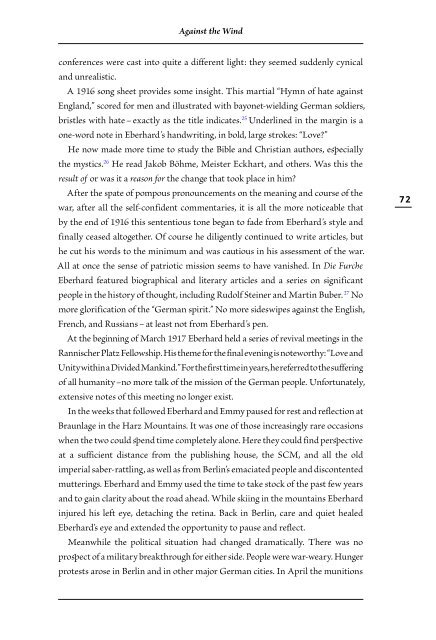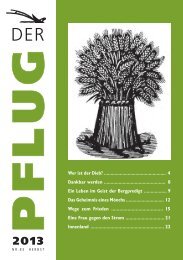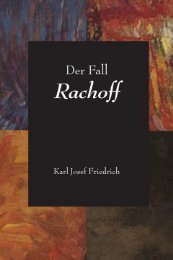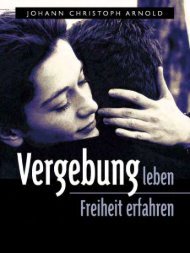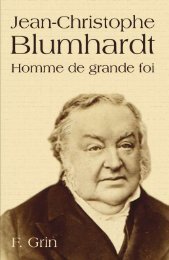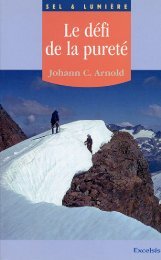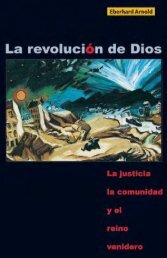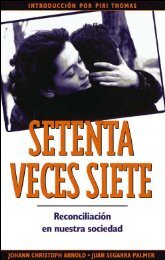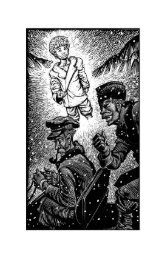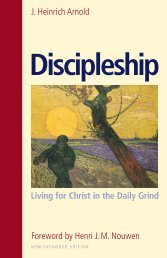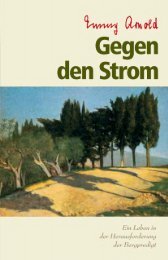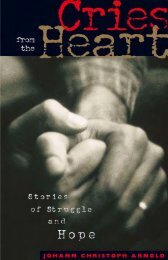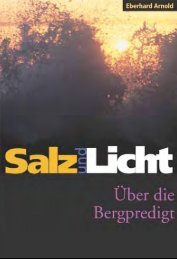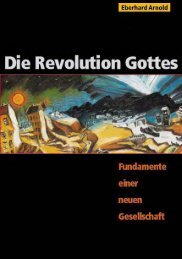Against the Wind: Eberhard Arnold and the Bruderhof - Plough
Against the Wind: Eberhard Arnold and the Bruderhof - Plough
Against the Wind: Eberhard Arnold and the Bruderhof - Plough
You also want an ePaper? Increase the reach of your titles
YUMPU automatically turns print PDFs into web optimized ePapers that Google loves.
<strong>Against</strong> <strong>the</strong> <strong>Wind</strong><br />
conferences were cast into quite a different light: <strong>the</strong>y seemed suddenly cynical<br />
<strong>and</strong> unrealistic.<br />
A 1916 song sheet provides some insight. This martial “Hymn of hate against<br />
Engl<strong>and</strong>,” scored for men <strong>and</strong> illustrated with bayonet-wielding German soldiers,<br />
bristles with hate – exactly as <strong>the</strong> title indicates. 25 Underlined in <strong>the</strong> margin is a<br />
one-word note in <strong>Eberhard</strong>’s h<strong>and</strong>writing, in bold, large strokes: “Love?”<br />
He now made more time to study <strong>the</strong> Bible <strong>and</strong> Christian authors, esecially<br />
<strong>the</strong> mystics. 26 He read Jakob Böhme, Meister Eckhart, <strong>and</strong> o<strong>the</strong>rs. Was this <strong>the</strong><br />
result of or was it a reason for <strong>the</strong> change that took place in him?<br />
After <strong>the</strong> spate of pompous pronouncements on <strong>the</strong> meaning <strong>and</strong> course of <strong>the</strong><br />
war, after all <strong>the</strong> self-confident commentaries, it is all <strong>the</strong> more noticeable that<br />
by <strong>the</strong> end of 1916 this sententious tone began to fade from <strong>Eberhard</strong>’s style <strong>and</strong><br />
finally ceased altoge<strong>the</strong>r. Of course he diligently continued to write articles, but<br />
he cut his words to <strong>the</strong> minimum <strong>and</strong> was cautious in his assessment of <strong>the</strong> war.<br />
All at once <strong>the</strong> sense of patriotic mission seems to have vanished. In Die Furche<br />
<strong>Eberhard</strong> featured biographical <strong>and</strong> literary articles <strong>and</strong> a series on significant<br />
people in <strong>the</strong> history of thought, including Rudolf Steiner <strong>and</strong> Martin Buber. 27 No<br />
more glorification of <strong>the</strong> “German spirit.” No more sideswipes against <strong>the</strong> English,<br />
French, <strong>and</strong> Russians – at least not from <strong>Eberhard</strong>’s pen.<br />
At <strong>the</strong> beginning of March 1917 <strong>Eberhard</strong> held a series of revival meetings in <strong>the</strong><br />
Rannischer Platz Fellowship. His <strong>the</strong>me for <strong>the</strong> final evening is noteworthy: “Love <strong>and</strong><br />
UnitywithinaDividedMankind.”For<strong>the</strong>firsttimeinyears,hereferredto<strong>the</strong>suffering<br />
of all humanity –no more talk of <strong>the</strong> mission of <strong>the</strong> German people. Unfortunately,<br />
extensive notes of this meeting no longer exist.<br />
In <strong>the</strong> weeks that followed <strong>Eberhard</strong> <strong>and</strong> Emmy paused for rest <strong>and</strong> reflection at<br />
Braunlage in <strong>the</strong> Harz Mountains. It was one of those increasingly rare occasions<br />
when <strong>the</strong> two could send time completely alone. Here <strong>the</strong>y could find persective<br />
at a sufficient distance from <strong>the</strong> publishing house, <strong>the</strong> SCM, <strong>and</strong> all <strong>the</strong> old<br />
imperial saber-rattling, as well as from Berlin’s emaciated people <strong>and</strong> discontented<br />
mutterings. <strong>Eberhard</strong> <strong>and</strong> Emmy used <strong>the</strong> time to take stock of <strong>the</strong> past few years<br />
<strong>and</strong> to gain clarity about <strong>the</strong> road ahead. While skiing in <strong>the</strong> mountains <strong>Eberhard</strong><br />
injured his left eye, detaching <strong>the</strong> retina. Back in Berlin, care <strong>and</strong> quiet healed<br />
<strong>Eberhard</strong>’s eye <strong>and</strong> extended <strong>the</strong> opportunity to pause <strong>and</strong> reflect.<br />
Meanwhile <strong>the</strong> political situation had changed dramatically. There was no<br />
prosect of a military breakthrough for ei<strong>the</strong>r side. People were war-weary. Hunger<br />
protests arose in Berlin <strong>and</strong> in o<strong>the</strong>r major German cities. In April <strong>the</strong> munitions<br />
72


